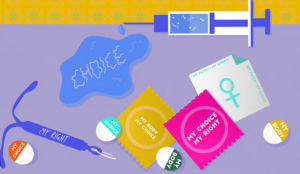|
Getting your Trinity Audio player ready...
|
Unplanned pregnancies can lead to unforeseen paths, presenting individuals with complex challenges. However, there’s a vital tool in our toolkit to address this: contraception. In this article, we will delve into the pivotal role contraception plays in averting unplanned pregnancies and, consequently, in reducing the necessity for abortions. The importance of easy access to both contraception and safe abortion cannot be emphasized enough, as their collective impact resonates profoundly in individual lives and throughout society.
Contraception
Contraception is a powerful shield that gives individuals the ability to plan and control their reproductive choices actively. It encompasses various methods, from pills to intrauterine devices (IUDs), offering a plethora of options suitable for different lifestyles and preferences. With contraception, individuals can make informed decisions about when and if they wish to conceive, empowering them to pursue their life goals and ambitions unhindered.
The effectiveness of contraception, when used correctly and consistently, drastically reduces the chance of unintended pregnancies. This not only provides peace of mind but also contributes to family stability and overall societal well-being. Contraception equips individuals with the ability to enjoy intimate relationships without the constant fear of an unplanned pregnancy, fostering healthy sexual lives.
Contraception and Empowerment
One of the most empowering aspects of contraception is that it allows individuals to take charge of their reproductive destiny. By having control over when or if they become parents, people can pursue education, careers, and personal growth without the disruptions and responsibilities that an unplanned pregnancy may bring.
Transitioning into the socioeconomic aspect, studies consistently demonstrate that access to contraception leads to higher education levels and better economic opportunities, particularly for women. When women can plan their pregnancies, they are more likely to complete their education, pursue advanced degrees, and establish their professional lives, contributing to a more prosperous and equitable society.
Contraception and Abortion
The link between contraception and abortion is profound. Access to reliable contraception significantly reduces the incidence of unintended pregnancies, subsequently lowering the number of abortions performed. When individuals have access to effective contraception and are educated about its use, the need for abortion as a result of unintended pregnancy is notably diminished.
The statistics, studies indicate that a substantial percentage of abortions occur due to contraceptive failure or non-use. By increasing access to contraception and ensuring proper education about its use, we can directly address this issue and substantially reduce the number of abortions, thus aligning with the broader societal goal of promoting reproductive health and choice.
Spreading Awareness about Contraception
Education about contraception is fundamental in ensuring its optimal use and effectiveness. Knowledge empowers individuals to make informed decisions about their sexual and reproductive health, guiding them toward choosing the right contraceptive method for their unique circumstances.
The importance of comprehensive sex education, when provided in schools and communities, it equips young individuals with the knowledge and skills necessary to use contraception effectively. By normalizing discussions about contraception, we reduce stigma and create a more informed society where individuals can confidently make choices that align with their well-being and life plans.
The Need for Affordable and Available Contraception
Despite the clear benefits of contraception, numerous barriers hinder access, particularly for marginalized communities. Affordability, lack of healthcare infrastructure, cultural barriers, and misinformation can prevent individuals from obtaining contraception, perpetuating the cycle of unplanned pregnancies.
The need for accessible healthcare, governments, and organizations must strive to make contraception affordable and readily available, especially in underserved areas. By removing these barriers, we can ensure that everyone, regardless of their socioeconomic status, has access to the tools needed to plan their families and futures effectively.
Overcoming Societal Stigma
Societal stigma and judgment often shroud discussions about contraception, making it difficult for some individuals to seek the information and resources they need. Breaking down these barriers requires fostering an environment of openness, understanding, and non-judgment.
The role of media and influencers, they can play a significant part in normalizing conversations about contraception, dispelling myths, and encouraging responsible sexual behavior. When society embraces these discussions, individuals will feel more comfortable seeking guidance and utilizing contraception effectively, ultimately reducing the rates of unplanned pregnancies and abortions.
Conclusion
The undeniable connection between contraception and the reduction of unplanned pregnancies and abortions emphasizes the critical need for accessible and comprehensive reproductive healthcare. By prioritizing education, breaking down barriers, embracing innovation, and fostering an inclusive and supportive environment, we can pave the way to a society where individuals can actively plan their families and futures, leading to healthier and more fulfilling lives.
You will find the following information useful:

